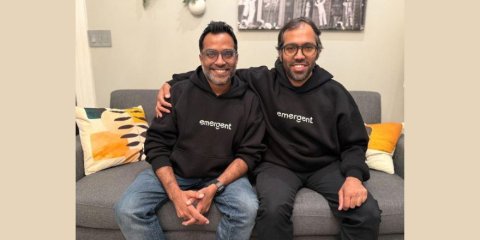
Co-founder Mukund Jha on democratising software creation, building autonomous business ecosystems, and why MENA is central to Emergent’s next chapter.
Emergent is aiming to make software creation as simple as describing what you want. Co-founded by twins Mukund Jha, Co-Founder and CEO and Madhav Jha, Co-Founder of Emergent —alumni of Google, Amazon, and Y Combinator—the AI-powered no-code platform has already attracted more than 2.5 million users who are generating production-ready apps in minutes rather than months. The company is backed by Lightspeed, Together Fund, and YC, and has topped leading coding-agent benchmarks en route to launching a toolset designed for real deployment, not just clickable prototypes.
Mukund spoke to Tahawultech.com on how Emergent plans to evolve from app building to fully autonomous digital ecosystems where AI can also run core functions such as marketing and operations. He also spoke about responsible AI, data ownership, and security-by-design, and sets out why the UAE and Saudi Arabia—buoyed by ambitious national AI agendas—are priority markets for localisation, partnerships, and community building.
Interview excerpts:
What inspired the creation of Emergent?
I co-founded Emergent with my twin brother, Maddy. We’ve both been programming since childhood. I later joined Google after leaving my PhD, while Maddy completed his PhD in machine learning and built the deep-learning team at Amazon. After leading Dunzo, one of India’s most loved quick-commerce brands, I left in 2023 to explore what was next in AI. We were fascinated by how large language models were evolving and saw an opportunity to automate programming itself. That vision became Emergent — a no-code, AI-powered platform that allows anyone to build software through natural language. Within a year, we topped global coding benchmarks and launched to empower creators worldwide.
How do you see Emergent evolving by 2026—from building apps to creating fully autonomous digital ecosystems?
We already have over 2.5 million users building apps on our platform, but that’s just the start. Our long-term vision is to go beyond app creation to autonomous business ecosystems — where AI not only builds the software but also manages core functions like marketing, operations, and analytics. For now, we’re focused on one promise: you describe what you want, and Emergent builds it — fully functional, production-ready, and deployable.
Does Emergent currently have a presence in the Middle East?
Not yet, but it’s a key priority. The Middle East is full of entrepreneurial energy and rapid digital transformation. We already have a strong user base in the region and plan to establish an office soon to work closely with startups, enterprises, and educational initiatives.
Who are Emergent’s investors?
We’re backed by Lightspeed, Together Fund, and Y Combinator. I personally joined YC’s Summer 2014 batch — it was an intense but transformative experience that shaped how I think about startups and innovation.
How do you plan to collaborate with UAE and Saudi initiatives to build AI-native entrepreneurs and localised innovation?
We’re in early conversations with several partners in the region. Many users here experience their first real AI use case through Emergent, as they discover how easily they can create business value.
“We’re looking to partner on both education and entrepreneurship fronts — enabling students, professionals, and founders to bring AI-led ideas to life. With governments emphasising AI and digital inclusion, we see strong alignment with our mission.”
As AI regulation strengthens in MENA, how is Emergent ensuring transparency and responsible use?
All apps and data on Emergent belong fully to our users. We don’t collect training data, and we follow the same compliance and security standards as our major LLM partners.Each app undergoes automatic compliance and vulnerability checks before deployment. As regulations evolve, we’ll work closely with authorities to ensure continued alignment with local governance.
What will the post-coding economy of 2026 look like?
Software development has long been an exclusive skill, but that’s changing. AI is making software creation accessible to everyone. Think of a small business owner who understands a problem deeply but can’t afford developers. With Emergent, they can turn an idea into a working product at a fraction of the cost. One user who runs a gardening business built an Uber-for-gardeners app on our platform. It would’ve cost him $100,000 elsewhere, but he did it himself, affordably — that’s the power of democratisation. We’ll see a global shift where creativity, not coding ability, drives innovation.
What milestones will define Emergent by the end of 2026?
Our goal is to make every creator successful. By 2026, we expect multiple startups that began on Emergent to achieve VC funding or join accelerator programs. We also foresee millions of entrepreneurs running AI-built software businesses — from solo founders to SMEs — all powered by Emergent’s technology.
What draws you to the Middle East?
This region is the future. It’s transforming from an oil-driven to a knowledge and digital economy. The entrepreneurial energy here is unmatched. Recently, I met a user at Dubai Airport who recognised me and said he was building on Emergent — that moment was deeply rewarding. It showed how connected this community already is, and how much potential lies ahead.


